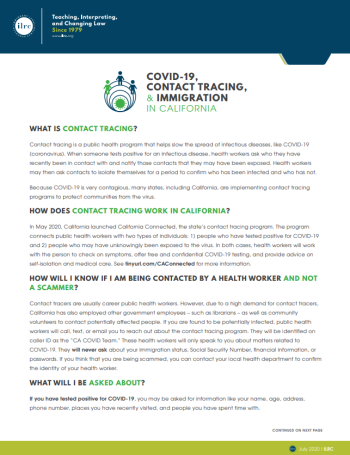
Contact tracing is a public health program that helps slow the spread of infectious diseases, like COVID-19 (coronavirus). Because COVID-19 is very contagious, many states have implemented contact tracing programs to protect communities from the virus. California launched California Connected, its contact tracing program, in May 2020. This resource, which describes the California Connected program in Q&A format, highlights issues of interest to the immigrant community, including the language competency of contact tracers, the confidentiality of shared personal information, and public charge considerations.
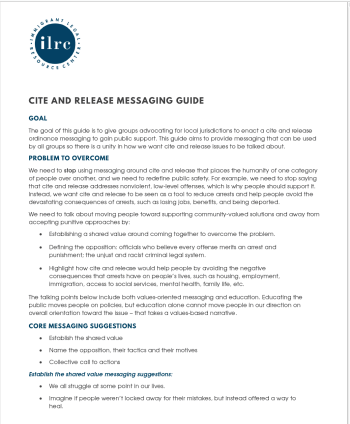
As groups across Texas advocate for cite and release policies in their own localities, it has become increasingly important that we utilize values-based messaging in our campaigns. This guide, available in multiple languages, provides messaging recommendations to ensure there is unity in how we talk about cite and release. It provides suggested language to ensure inclusive messaging that uplifts the dignity and humanity of all community members, regardless of criminal history.
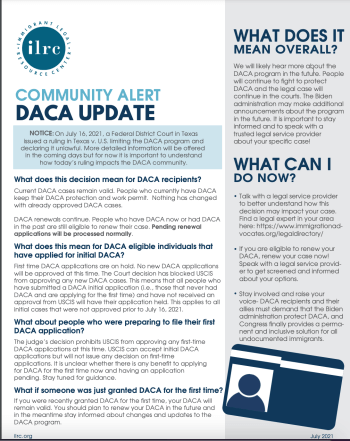
On July 16, 2021, a Federal District Court in Texas issued a ruling in Texas v. United States limiting the DACA policy and declaring it unlawful. More detailed information on this decision will be offered in the coming days but for now it is important to understand how today’s ruling impacts the DACA community.
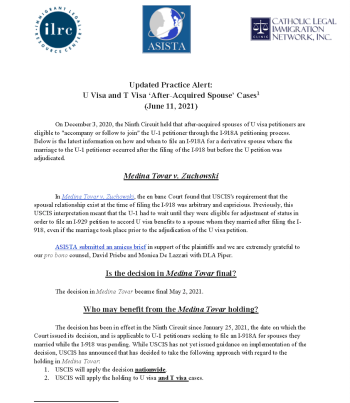
The Ninth Circuit’s decision in Medina Tovar expanded eligibility for U derivative status for certain after-acquired spouses of U visa petitioners. ASISTA, CLINIC & ILRC’s new Practice Alert includes the latest information on how and when to file an I-918A for a derivative spouse where the marriage to the U-1 petitioner occurred after the filing of the I-918 but before the U petition was adjudicated.

The majority of states have legalized some use of marijuana, but marijuana remains a federal Schedule I controlled substance. Therefore, any conduct involving marijuana can be very dangerous for immigrants – including conduct that is permitted under state law. Admitting that one has “legally” used marijuana, being employed in the fast-growing cannabis industry, and any conviction can cause serious immigration problems. A prior marijuana conviction must be vacated based on some error; the fact that the state has since legalized the conduct does not erase it, and many state “mass expungement” actions also do not. Evidence that a person has sold marijuana can harm any noncitizen, in some cases including immigrant youth. Marijuana issues can cause bars to eligibility for affirmative applications such as adjustment of status and naturalization; admission at the border; and cancellation and other applications in removal proceedings.

This handout provides a list of some of the most common public benefits programs that do not count for public charge. Whether or not public charge applies to you and no matter your immigration status, the programs on this list are safe to use.

Applicants must meet certain requirements to be eligible for DACA, including showing that they have been continuously residing in the United States since June 15, 2007. Acquiring documents to use as evidence to prove the continuous residence requirement can be tedious. As such, this resource focuses on the types of evidence initial DACA applicants can gather to prove continuous residence and where applicants can get this evidence.
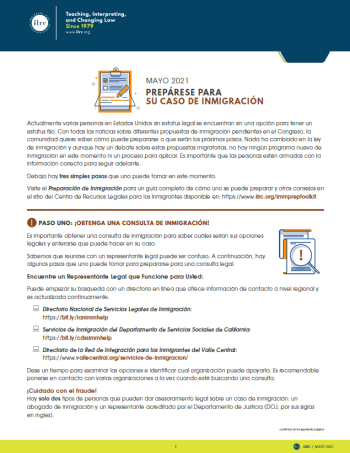
Los recientes anuncios sobre las propuesta sobre la reforma migratoria en el Congreso han dejado a muchos miembros de la comunidad con preguntas, y aunque ninguno de estos proyectos de ley son ley, muchos se preguntan cómo pueden prepararse para un caso de inmigración en el futuro. Este recurso proporciona tres pasos que los miembros de la comunidad pueden tomar ahora para comprender sus opciones legales y lo que pueden esperar al buscar apoyo legal.
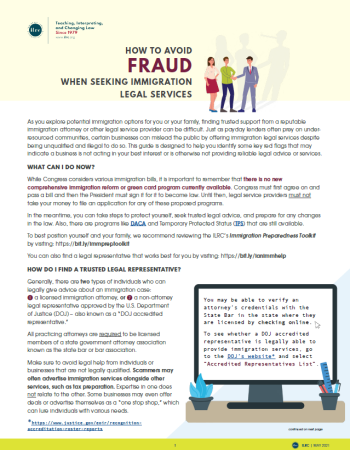
As you explore potential immigration options for you or your family, finding trusted support from a reputable immigration attorney or other legal service provider can be difficult. Just as payday lenders often prey on under-resourced communities, or predatory scammers pose as immigration officials to demand gift cards, certain businesses can mislead the public by offering immigration legal services despite being unqualified and illegal to do so. This guide is designed to help you identify some key red flags that may indicate a business is not acting in your best interest or is otherwise not providing reliable legal advice or services.
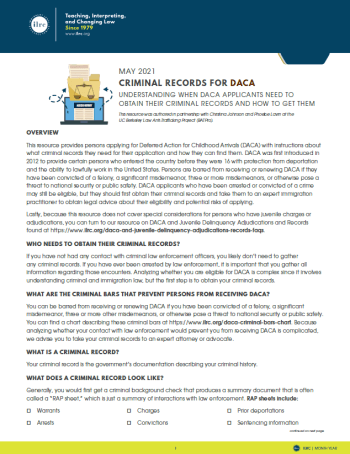
Persons are barred from receiving or renewing DACA if they have been convicted of a felony, a significant misdemeanor, three or more misdemeanors, or otherwise pose a threat to national security or public safety. DACA applicants who have been arrested or convicted of a crime may still be eligible, but they should first obtain their criminal records and take them to an expert immigration practitioner to obtain legal advice about their eligibility and potential risks of applying. This resource provides persons applying for DACA with instructions about what criminal records they need for their application and how they can find them.